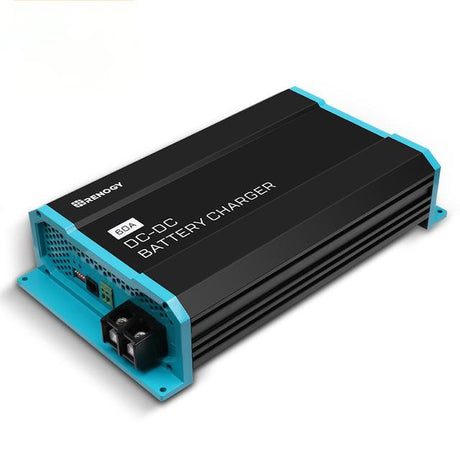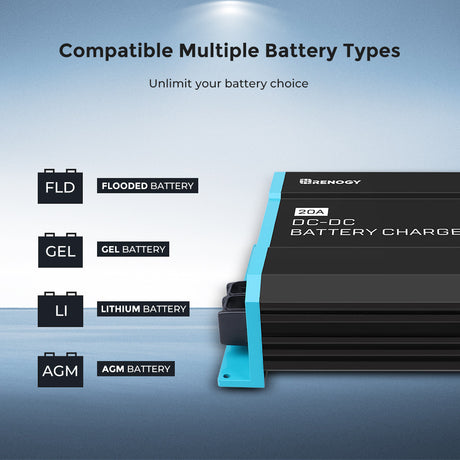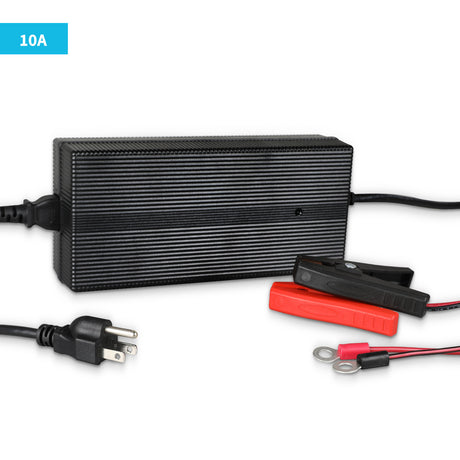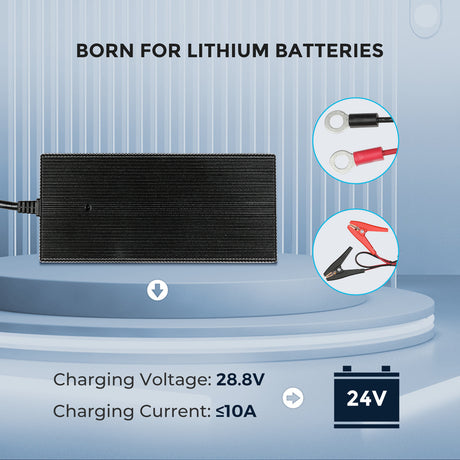- Hot
Renogy
Chargeur de batterie embarqué 30 A/50 A 12 V CC-CC avec MPPT
94% charging efficiencyDC-DC dual inputDe C$265.99C$274.99Prix unitaire /Indisponible Renogy
Chargeur de batterie RENOGY IP67 50 A DC-DC avec MPPT
97% charging efficiency12/24V boost & buck logicDe C$384.99Prix unitaire /IndisponibleRenogy
Chargeur de batterie 12 V 40 A CC vers CC (nouvelle édition)
94% charging efficiencyRemote monitoringDe C$138.99Prix unitaire /IndisponibleRenogy
Chargeur de batterie RENOGY 40A DC-DC avec MPPT
93% charging efficiencyDC-DC dual inputC$180.99C$186.99Prix unitaire /IndisponibleRenogy
Chargeur de batterie portable LFP 12 V 20 A CA vers CC
92% charging efficiency3-stage smart chargingC$136.99Prix unitaire /Indisponible
Frequently Asked Questions
What is the lifespan of a battery charger?
What is the lifespan of a battery charger?
A high-quality battery charger can last for many years, often lasting 5 to 7 years on average, especially if it's stored and used correctly. The lifespan depends on the build quality, whether it's used in harsh environments, and how often it's used. Look for chargers with robust construction, built-in safety features, and a good warranty.
Do battery chargers shut off automatically?
Do battery chargers shut off automatically?
Yes, most quality battery chargers sold today, especially those from reputable brands like Renogy, are "smart" chargers that automatically switch to a maintenance mode once the battery is fully charged. This prevents overcharging, which can damage the battery and is a crucial safety feature.
Does it hurt to leave a battery charger plugged in all the time?
Does it hurt to leave a battery charger plugged in all the time?
No, it does not hurt to leave a modern, smart battery charger plugged into your battery all the time. As mentioned, these chargers switch to a low-current maintenance mode once the battery is full. This "float charge" is designed to keep the battery at an optimal charge level without causing any harm. It's a great way to ensure your battery is always ready to go, especially for vehicles or equipment stored for long periods.
How long does it take a battery charger to charge a battery?
How long does it take a battery charger to charge a battery?
The time it takes to charge a battery depends on a few factors: the battery's size (Ah rating), its current state of charge, and the output current (amps) of your charger. A good rule of thumb is to divide the battery's Ah rating by the charger's amp output. For example, a 100Ah battery with a 20A charger would take roughly 5 hours to go from a low charge to full, not including the final "topping off" phase.
How long does it take to charge a 12-volt battery with a 6 amp charger?
How long does it take to charge a 12-volt battery with a 6 amp charger?
To get a rough estimate, you need to know your battery's amp-hour (Ah) rating. The general formula is to divide the battery's Ah rating by the charger's amp output. For example, if you have a 100Ah battery and a 6A charger, it would take approximately 16.7 hours (100Ah / 6A). Keep in mind this is a theoretical number; the actual charging time will be longer due to factors like the battery's state of charge, its health, and charging inefficiencies.
Will a battery charger charge a dead battery?
Will a battery charger charge a dead battery?
Most modern smart battery chargers are designed with a "desulfation" or "recondition" mode that can help recover a deeply discharged or "dead" battery. However, if the battery is completely flat (0 volts) or has an internal short, a charger may not be able to bring it back. For the best results, it's always recommended to use a charger with a built-in recovery mode.
How to check if a battery charger is working correctly?
How to check if a battery charger is working correctly?
The easiest way to check if your charger is working is to connect it to a battery and monitor the charge. A working charger will show a steadily increasing voltage on a voltmeter. Many modern chargers also have an LED indicator to show the charging status (e.g., a green light for "charged" or a blinking light for "charging"). You can also use a multimeter to check the charger's output voltage.
How do DC to DC battery chargers work?
How do DC to DC battery chargers work?
DC to DC battery chargers are essentially "smart" isolators. They connect to your vehicle's alternator and your house batteries. While you drive, they sense the alternator is running and efficiently pull a controlled amount of power to charge your house batteries. This provides a multi-stage charge, which is healthier for your batteries than a basic isolator and is perfect for keeping your power supply topped up while you're on the move.
What is the difference between a standard battery charger and an MPPT charger?
What is the difference between a standard battery charger and an MPPT charger?
A standard battery charger typically converts one form of power (like AC from a wall outlet) to DC to charge a battery. An MPPT (Maximum Power Point Tracking) charger, on the other hand, is a specific type of solar charge controller. Its primary function is to optimize the power from solar panels, ensuring it extracts the maximum possible power to send to your battery, especially during colder or cloudy conditions.
What is the best battery charger for my RV?
What is the best battery charger for my RV?
The best battery charger for your RV depends on how you plan to use it. For charging from a standard shore power outlet, an AC to DC charger is your best bet. If you want to charge your house batteries from your engine's alternator while you drive, a DC to DC charger is the most efficient choice. For a complete off-grid solution, a DC to DC charger with MPPT (Maximum Power Point Tracking) is a fantastic option as it can also integrate power from your solar panels.















